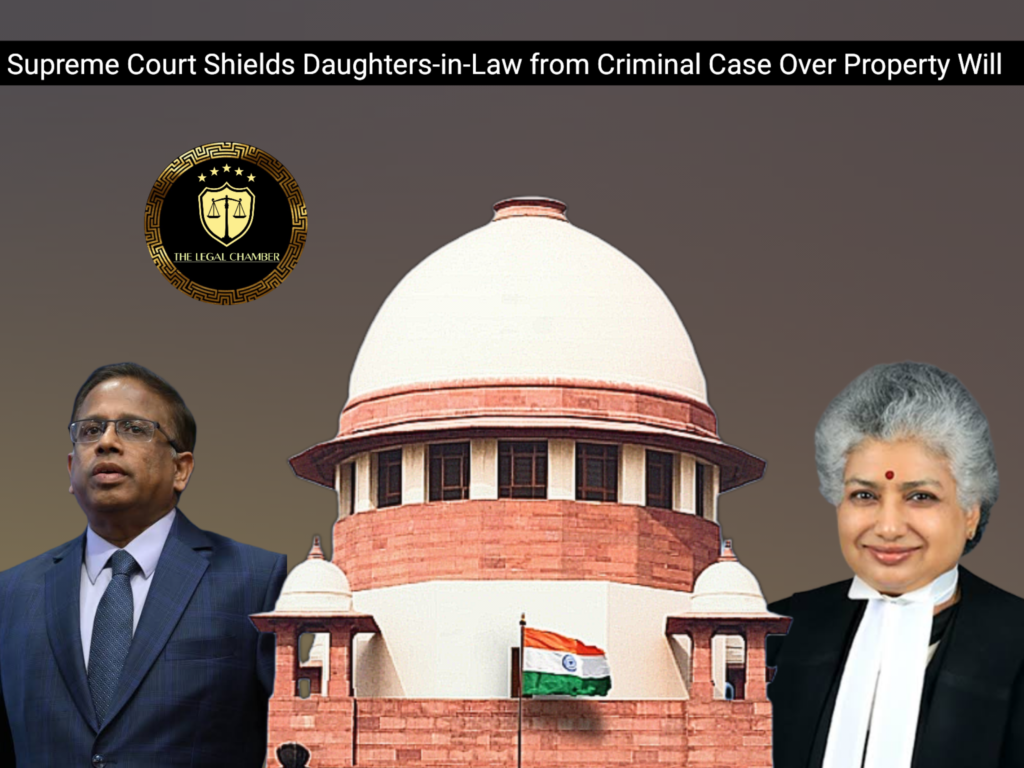
The Supreme Court quashed criminal proceedings under Sections 419, 420, 467, 468, and 471 IPC, ruling the allegations did not prima facie constitute the alleged offences. Relying on Bhajan Lal, it held that criminal process cannot be used to settle civil disputes, as it amounts to an abuse of the court’s process.
Facts Of The Case:
A testator, Shri Ram Baksh Dubey, executed an unregistered will in 1993 bequeathing his property to his four daughters-in-law, apprehensive that his third son, Ashish Kumar, would squander the estate. After the testator’s death in 1994, Ashish Kumar sold his purported share to the complainant, Balram, via a registered sale deed. The daughters-in-law, unaware of this sale, successfully obtained a mutation order in their favor based on the will. When Balram interfered with their possession, they filed a civil suit for injunction. In response, Balram filed a criminal complaint in 2001, alleging the daughters-in-law and others conspired to forge the will after the testator’s death to circumvent his sale deed. This led to the registration of a case under sections 419, 420, 467, 468, and 471 of the IPC. The appellants approached the High Court to quash these proceedings, but their petition was dismissed, leading to the present appeal before the Supreme Court.
Procedural History:
The procedural history began with the filing of a criminal complaint case No. 627 of 2002 before the Chief Judicial Magistrate, Basti, which issued summons to the appellants. Challenging this, the appellants filed an application under Section 482 of the Cr.P.C. (No. 6543/2003) before the Allahabad High Court seeking to quash the proceedings. The High Court dismissed their application vide its impugned order dated 09.04.2019. Aggrieved by this dismissal, the appellants filed a Special Leave Petition (SLP (Cri.) No. 10251 of 2019) before the Supreme Court. The SLP was converted into Criminal Appeal No. 3300 of 2025, which was allowed, setting aside the High Court’s order and quashing the criminal proceedings.
READ ALSO :When Protest Isn’t Nuisance: Supreme Court Explains Limits of Police Power, Quashes 5-Year-Old Case
Court Observation:
In its observations, the Supreme Court found that the allegations in the complaint, even if taken at face value, did not prima facie constitute the essential ingredients of the offences under Sections 419, 420, 467, 468, and 471 of the IPC. The Court noted a complete absence of criminal breach of trust, cheating by personation, or dishonestly inducing delivery of property. It observed that the criminal proceedings were manifestly instituted as an abuse of the process of law, serving as a circuitous tool to pressurize the appellants in what was essentially a civil property dispute. Relying on the precedent in State of Haryana v. Bhajan Lal, the Court held that allowing such a prosecution to continue, where the chances of conviction were bleak and the motive was ulterior, would be a miscarriage of justice. The Court emphasized that the machinery of criminal justice cannot be used for settling civil disputes or for harassment.
Final Decision & Judgement:
The Supreme Court allowed the appeal and set aside the impugned order of the High Court. Consequently, it quashed all proceedings in Criminal Complaint Case No. 627 of 2002 pending before the Chief Judicial Magistrate, Basti. The Court held that the continuation of the prosecution constituted an abuse of the process of law, as the allegations did not disclose a prima facie case for the alleged offences and the dispute was essentially civil in nature. It clarified that any observations made in this judgment would not affect any civil proceedings between the parties.
Case Details:
Case Title: Urmila Devi & Others vs. Balram & Another Citation: 2025 INSC 915 Criminal Appeal No.: Criminal Appeal No. 3300 of 2025 Date of Judgement: July 31, 2025 Judges/Justice Name: Justice B.V. Nagarathna and Justice K.V. Viswanathan
Download The Judgement Here